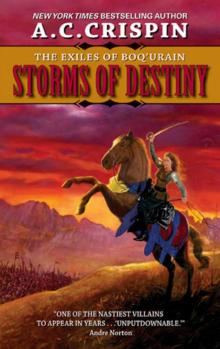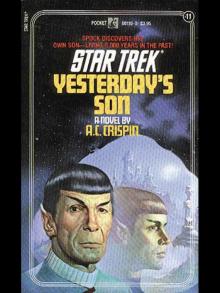- Home
- A. C. Crispin
Storms of Destiny Page 10
Storms of Destiny Read online
Page 10
“And what is that?”
“A woman who sells her body—her womanhood—to any man who cares to pay the price. That man who was with her was her pimp. He sells her services, collects the money from the men who, who …” Jezzil shook his head and trailed off.
“I see,” she said, and, glancing up, Jezzil could tell that she did, indeed, comprehend. “And there are many such women in towns and cities?”
Jezzil nodded. “And sometimes young men. Boys.”
Thia shook her head. “I had no idea … and that is how they earn their keep?”
“Yes. Hardly a pleasant existence, I would think,” Jezzil muttered, still unable to meet her eyes. A thought struck him.
“What did you mean when you said you would soon be on your own?”
She hesitated, gave him a sideways glance as they walked on. Jezzil kept his gaze on her, but he did not push, only waited silently.
Finally, she said, “Do not tell, but I must leave the Shekk in a few days, when we reach Q’Kal.”
“Why? How?”
She answered the second question first. “I shall wait until we camp near the city, then slip away, leaving no trace of where I am going. I’ll find someplace to live, some useful work to do. There must be work for someone who is willing …” Her voice was not quite steady as she trailed off.
“Why?”
“I can’t endanger the Shekk and his family. As long as I am with them, I make them targets for the priests. They have been kind to me. I cannot let them be harmed.”
Jezzil nodded. “I shall miss you, Sister Thia.”
“And I you, Brother Jezzil. But there is no help for it.”
They walked on together until they were close to the wagons. Then Thia turned to the Chonao, her dark eyes intent above her veil. “Please, I am trusting you. Don’t tell anyone.”
“I swear,” he said quietly. “I am Pen Jav Dal, remember?”
In the mountains of Amaran, winter still reigned. The black peaks and desolate rocky passes wore mantles of shimmer-ing white snow and blue-tinged ice. The cold was a tangible presence. It rode with him, walked with him, lived with him, and clung to him like the lover he had never had.
He had traded in his scarlet robe for a deerskin shirt and leggings with the fur worn inside, plus a hooded fur cloak and mittens, but he was still chilled much of the time. Only when the sun shone brightly at midday, or when he stopped for the night at a hostel or crofter’s hut, did he truly feel warm and comfortable. His shaven pate still marked him for who he was, so he was always given the best seat in the house, the one closest to the fire.
The crofters and innkeepers must have thought him mad, traveling by horseback alone in these barren, winter-locked mountains. But they kept their opinions, if any, to themselves and never even looked at him directly, so greatly did they fear him. For a High Priest of Boq’urak to be traveling so far from the twin ziggurats without an entourage and armed escort was unheard of—but nobody challenged him.
Even the robbers who infested the heights left him alone.
They were all too frightened of the One he served.
How ironic that is, Varn thought derisively. I am traveling without the permission of my order, much less their blessing.
If any of these robbers were to kill me, there would be no reprisal for my death. Why should the council enact punishment for the death of one of their own who is now disgraced? One who defied the orders of the council to search for a missing novice they all firmly believe is dead?
Oh, they had searched for Thia, searched for months. But the girl had vanished into the blizzard as thoroughly as a single snowflake vanished into a snowbank. In vain had the High Priests invoked the god, asking him to reveal Thia’s whereabouts. Boq’urak had remained silent.
At last they had concluded that she must be dead, that she’d gotten lost in the blizzard and wandered off the road.
Her body might be found come spring, partially thawed and gnawed by predators. Or, more likely, she had fallen into some crevice in the rocks and would never be found.
Varn was the only one who refused to accept the decree of the council. He had stubbornly maintained that Thia lived, that she had escaped, and that she must be tracked and brought back to the twin ziggurats so she could atone for her sin against the god.
He had no concrete reason for his belief, just a growing conviction that he must search for Thia. So when word had come to Verang a tenday ago that an unseasonable early spring thaw had cleared the mountain passes, he filled a sad-dlebag with provisions and some clothing, took all the money he could lay his hands on from his brother priests’ secret stashes, saddled a horse and rode out before dawn.
Since leaving Verang, he’d spent each day in the saddle, chilled but resolute, determined to succeed in his quest.
Now, as his mount picked its way along the downslope of the last pass leading out of the Amaranian heights, Varn realized that the ice and snow surrounding him was not piled quite as high. The Sun was beating down on the hood of his bearskin cloak, and he was actually warm enough to push it back in order to feel it on his face and his naked scalp. Soon after, he dared to slide off his furred mittens.
Three hours later the trail he was following paralleled a narrow rivulet of stream, and the water was actually flowing.
Varn halted his mount and swung down, his nearly empty waterskin in hand.
Leaving his horse tethered to the spiky branch of a conifer, Varn picked his way across the wet rocks until he could crouch on a small, flat tongue of stone to fill his waterskin. Before him lay an icy section of the cliff, black rock shadowed from the Sun.
After so many days riding through a completely frozen landscape, the rush of flowing water was like a benediction.
Trying to keep his hands from touching the icy current, he lowered the waterskin into the stream. As it slowly filled, he looked across the little rivulet to the ice-rimed cliff wall and beheld his own reflection. It had been years since he’d seen himself; mirrors were a symbol of vanity, not allowed by the order.
Varn stared at himself, fascinated. He looked very different as a man than he had as a boy.
As he stared, time seemed to slow, to stop around him.
The real world receded, grew distant. His face began to Change.
At the same moment, he felt the touch of the god within his body. Varn had been Incarnate three times, and recognized the sensation of having his body shift and alter when Boq’urak touched it.
His face … it was now overlaid with the face of the god.
His eyes were his no longer, but Boq’urak’s huge, round, lidless orbs. He was not truly Incarnate, for no tentacles had sprouted and his suddenly dry mouth had not actually changed shape, but there was no denying the presence of Boq’urak within him, the stamp of Boq’urak lying like a brand across his own unfamiliar features.
He managed to move his lips. “Lord,” he said. “Command thy servant.”
The voice spoke. Was it solely in his mind, or was it actual sound? Varn could not tell. My servant, it said. My faithful servant.
Varn felt a tremendous surge of gratitude and affirmation.
“Lord,” he said. “I left the order behind to go in search of the novice, Thia. My brethren did not understand why I did that. I am as outcast as she is now.”
They will understand when you return to them, the voice said. You will be honored for your faith. Nothing moves save by My hand.
He nodded. “Thank you, Lord. You want me to find her and capture her. That is your will?”
It is My will. She has witnessed the Rite of Incarnation.
She has denied Me. She must pay for her impiety. Capture her, and give her to Me. Perform the rite with her.
Varn swallowed, as his throat suddenly seemed to close up. Thia … so warm, so alive, lying dead before him?
“Must she pay with her life, Lord?” he ventured. “Surely she can be brought back to the way. She is … she is so young.”
S
he will be Mine.
Varn nodded. “I will obey, Lord.”
Without warning, the external world returned with a rush.
The waterskin slipped from his numb fingers, and he pitched forward, his arms going up to the elbows in the stream’s frigid embrace. Master Varn gasped, groping for his waterskin. By the time he found it and hoisted it out of the stream, then looked back up, the Sun had gone behind a cloud. The High Priest could no longer see himself in the icy surface of the black rock.
Memories of Thia assailed him as he stood and went over to fasten the waterskin to his saddle, then mounted his horse.
Thia as a child, looking admiringly up at him, her huge dark eyes filled with trust. Thia as a girl, gawky and coltish, her intelligence setting her apart from the rest of the postulants.
Thia as a novice, her body beneath the shapeless habit ripe with the promise of a woman’s curves, a woman’s fire …
Varn’s mouth tightened. She was not for him. Boq’urak had spoken. She would go to the god, and he would be but the vessel that contained the god’s essence. It would not be his hands that stroked Thia’s nakedness. It would not be his body that mounted her.
Hot resentment flickered. Boq’urak has spoken. Very well.
He will take her body, and her life. But before I relinquish myself to Him, I will take some reward for myself. An embrace. A kiss. I will tell her I love her, and hear her speak of her love for me. And then we shall share a kiss. Boq’urak said I was His faithful servant. Surely He will not begrudge me one kiss.
Six days after their stopover at the village of Coquillan, the caravan was camped in a large meadow just outside Q’Kal.
Thia struggled through the last meal she spent with the old Shekk and his daughters, wishing all the while that she could openly thank them for their kindness and say farewell. She reminded herself fiercely that her actions were for their own good, but in the past months they had become dear to her, and it was hard to know that she would never see them again.
After supper, as the sun was setting in a splash of sullen crimson, she put on all her clothing, layering it on so she would not have to carry it. Lastly, she pulled on her dullest, most nondescript tunic and skirt, then laced on her stout boots. She had no bag, only her shawl, to serve as a pack.
Quickly, she arranged her few belongings in the center—the arm bangles and necklaces the Shekk had bestowed upon her, the few coins she’d managed to hoard, and a small parcel of bread, dried fruit, and cheese, then brought the corners together and tied them into a pack that could be slung across her back.
Slipping through the evening shadows, Thia stole away from the familiar wagon, feeling tears threaten. She blinked them back, concentrating only on moving quickly and staying unseen.
She kept to the underbrush until out of sight of the caravan, then resolutely squared her shoulders and struck out on the hard-beaten road that led into Q’Kal.
The caravan had camped on a hill overlooking the city, and as it grew darker, she saw the lights spring up before her as the lamplighters made their rounds. Q’Kal was a large city, far bigger than any she had seen before.
Thia swallowed, fighting down her fear, and forced herself to keep walking swiftly. She had no idea where she might be able to obtain lodging or food, and was terrified that someone would mistake her for a whore because she was alone and friendless. Since Jezzil had told her about whoring as a way for a woman to earn her living, she’d eavesdropped with far greater attention to the rough talk of the guardsmen as they approached the city. The way they talked about whores frightened her—as though they were not women at all, only vessels for their seed, bodies for them to manhandle.
She tightened her modesty veil, determined not to let anything but her eyes show. According to what she’d seen, whores went unveiled, so she hoped her veil would keep her from being accosted.
For a while she’d considered dressing like a boy. Her hair was still barely long enough to touch her ears and collar, and she was slender enough, with small breasts. But since coming to stay with the Shekk, and having more to eat, she would have had to bind her breasts painfully in order to appear sufficiently flat-chested. Her voice was a problem; too high-pitched. And, most important, she had not spent enough time in the company of men or boys to emulate them. So Thia had reluctantly abandoned the notion.
After weeks with the caravan, she was accustomed to long marches. She lengthened her stride, falling into the mindless rhythm of walking, determined to get into Q’Kal before the city gates were closed for the night.
She concentrated on moving swiftly and surely, determined not to think about where she would sleep, how she would live, what would happen. Let the future worry about itself, the present is where we live, she thought, remembering an old Amaranian proverb.
Hoofbeats sounded behind her on the road. Thia’s heart bounded in her chest. Could the Shekk have missed her?
Quickly, she scuttled to the side of the road, scrambled up the bank and pushed her way into the brush, feeling greenbriers catch her clothing and flesh.
Dropping to her hands and knees, she wormed her way into a thicket, then peered out cautiously.
A rider was approaching, sure enough, a rider astride a horse that moved as smoothly and quietly as a shadow. Thia tensed. It couldn’t be … could it? There are many gray horses …
Just as the horseman came abreast of her hiding place, the gray halted, standing obediently in the middle of the road.
Thia heard the rider’s voice. “Thia? I know you are there.
Come out.”
She blinked in astonishment, then wriggled forward, losing more skin and snagging her veil so thoroughly that she had to remove it to untangle it. “Jezzil?” she whispered as she struggled with the thin fabric, trying not to tear it.
“Yes …”
Finally the veil came free, and she hastily fixed it in place, then slid down the bank, her small bundle of food and her few possessions bumping along beside her.
Falar whickered as she caught the familiar scent. “What are you doing here, Brother Jezzil?” Thia asked as she walked up to pat the mare’s neck.
“I came looking for you tonight, and you were gone.” The Moon would rise late, and she could not make out his features, only see his form silhouetted against the sky. “You left without saying farewell.”
Thia bit her lip, hesitated, then blurted, “Forgive me. I couldn’t bear to. I was afraid …”
“Afraid of what?”
“Afraid of everything. But mostly afraid that if I tried to bid you farewell, I would lose the will to go. And I must go,”
she said fiercely. “I’m endangering the Shekk and his daughters—perhaps even the whole caravan!—by my very presence. I had to get away.”
He did not answer, but dismounted smoothly from Falar’s back and walked over to her. Try as she might, she could not discern his features save as a pale blur. “I know,” he said. “I do understand. But … I found I could not stay with the caravan when you were gone. I had to come after you.”
She shook her head dazedly. “Wh-Why?”
“Because, Sister Thia, I understand you. I trust you. And I cannot see you come to harm because you are alone in a strange city.” His hand moved to his side and she heard the clink of coins as he jingled them. “I asked for my payout and left.”
“You’ve left your job?” Thia could scarcely believe it.
“Yes. We’ll go to Q’Kal together. You’ll be safer that way.
And I …” He hesitated, then chuckled, one of the first signs of amusement she’d ever detected in him. “And I will have someone to talk to, someone who understands.”
Thia’s mind raced like a herd of startled cattle. “You want to stay with me? For us to … live together?”
He took a step toward her. “Fear not, I mean no disrespect, sister. I speak only with respect and friendship. I believe we could … help … each other.”
She backed away a step, hesitated. “You are t
elling the truth,” she muttered, thinking furiously. “I know you are.”
“I would never lie to you,” Jezzil said.
“You had better not,” Thia said dryly.
The movement of his head reminded her of Falar’s when she pricked up her ears and gazed warily into the distance.
“Aside from the fact that lying is a sin,” he said, “and I have enough sin burdening my soul to last me for a dozen lifetimes, what did you mean by that?”
She took a deep breath. “I can tell when someone is lying,” she said. “Always.”
He did not speak for a moment, then, when he did, his words were slow, thoughtful. “I … see. How do you do that?
Can you read faces, eyes, that well?”
“I don’t know how I do it,” she said. “I just can. I don’t need to see faces, or eyes.”
He made a sound, half amused, half skeptical.
Thia flushed. “I can prove it,” she said. “Tell me three things from your past, make one of them a lie. I cannot see your face in this darkness.”
“You don’t have to prove—”
“Just do it.”
Jezzil was silent for a moment, then said, in slow, deliberate tones, “I abandoned my brothers to die in a fire. I have never known a woman. I slew a monster in a moat.”
Thia laughed harshly. “You think to trick me,” she said.
“All of those things are the truth.”
Now it was Jezzil’s turn to take a step backward. “How do you do it? Magic?”
“I don’t know. I just can,” she replied. “I have always been able to do it.”
“Can you do other magic?”
“No,” she said, then remembered that he’d known where she was, even when she was hidden. “Can you?”
“I … I …” He stammered for a moment, then must have remembered who he was talking to, and said simply, “Yes.”
“Let me think for a moment,” Thia said. Folding her arms across her chest, she paced back and forth across the road, thinking. It would be good to have someone to talk to, she mused. But … he is a man! From what the High Sister told us, even men who are well-intentioned cannot control themselves. There were stories that even the High Priests suc-cumbed to fleshly temptations in Verang at times.

 Alien Resurrection
Alien Resurrection Star Wars - The Han Solo Trilogy - Rebel Dawn
Star Wars - The Han Solo Trilogy - Rebel Dawn Storms of Destiny
Storms of Destiny Starbridge
Starbridge Serpent's Gift
Serpent's Gift Pirates of the Caribbean: The Price of Freedom
Pirates of the Caribbean: The Price of Freedom V01 - V
V01 - V Silent Dances
Silent Dances V
V Yesterday's Son
Yesterday's Son Shadow World
Shadow World STAR TREK: TOS #11 - The Yesterday Saga I - Yesterday's Son
STAR TREK: TOS #11 - The Yesterday Saga I - Yesterday's Son Star Wars - Han Solo Trilogy - The Paradise Snare
Star Wars - Han Solo Trilogy - The Paradise Snare Star Trek - Sarek
Star Trek - Sarek Star Wars: The Han Solo Trilogy I: The Paradise Snare
Star Wars: The Han Solo Trilogy I: The Paradise Snare